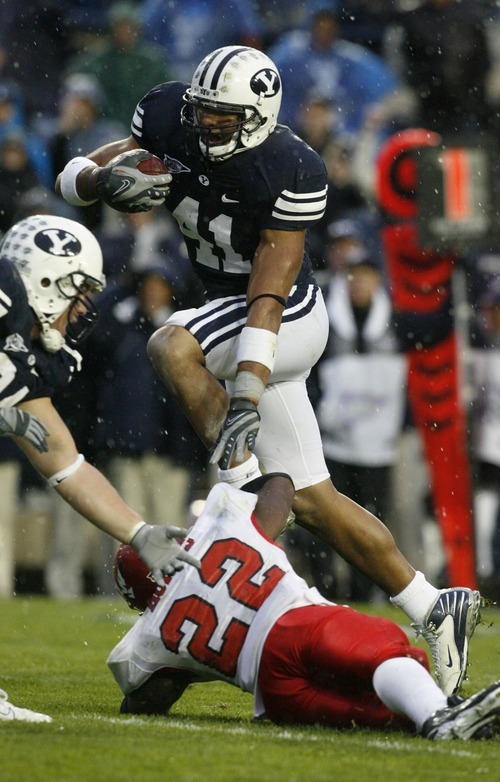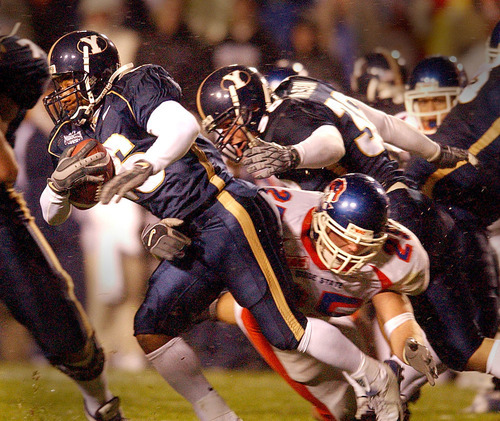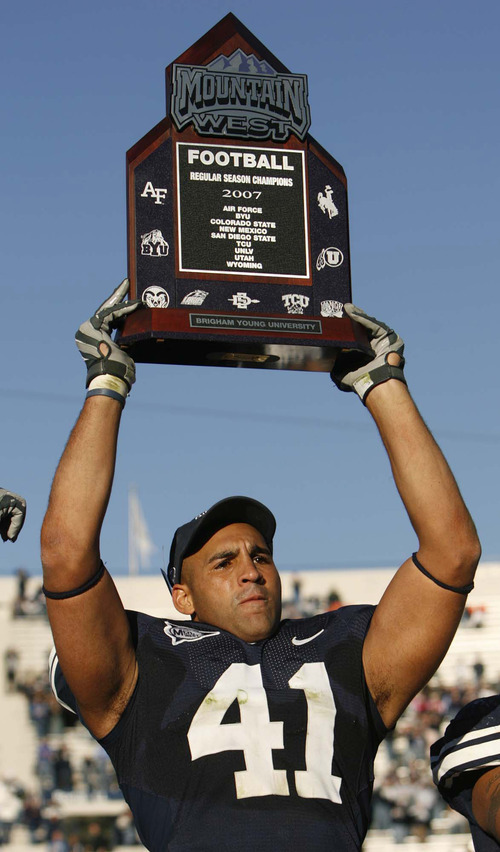This is an archived article that was published on sltrib.com in 2011, and information in the article may be outdated. It is provided only for personal research purposes and may not be reprinted.
In January 2004, some members of Brigham Young University's football team gathered at a player's Provo home after a recruiting social and dance. Several of the young men, mostly African-Americans, engaged in oral sex with a female student, sparking a probe by the Mormon Church-owned school's Honor Code Office after video of the group encounter was circulated.
The university immediately suspended running back Thomas Stancil and several other minority players for violating the school's strict moral rules, disrupting their college careers. Seven years later, the incident is being highlighted as exhibit A in the argument that BYU is much more likely to drop the honor-code hammer on minority athletes than their white peers.
While university officials flatly deny race has ever played a role in honor code enforcement, critics charge that blacks are disproportionately sanctioned.
In an article posted last week on the sports news site Deadspin.com, Stancil and other former African-American BYU players complain the school pulled a "bait and switch," recruiting them to BYU in the early 2000s by painting it as a typical college campus, then ensnaring them in school's Honor Code. In addition to banning dishonest and illegal behavior, the Honor Code bars students from engaging in premarital sex, drinking and habits (growing facial hair, getting tattoos and drinking coffee) that can be normal parts of college life on many other campuses.
It essentially holds young men unfamiliar with LDS culture to the highest moral standards in Mormon society, while they are confronted with the attention and temptations that go along with big-time college sports.
"That's not being realistic. You are not recruiting angels," said Stancil, who completed college in Bakersfield, Calif., and now works as a corrections officer. "You're going to the ghettos to get athletes, a black athlete who has been around poverty, sex and drugs. You put a meal ticket in front of his face, full-ride scholarship, good school, [say] you get to live a great life, but you have to follow these rules. I'm going to sign that paper like it's nothing. I'm not even 18 years old."
Deadspin writer Luke O'Brien and former BYU adjunct professor Darron Smith analyzed all the known sanctions imposed on athletes since 1993 and interviewed eight former football players. In the 70 cases in which an athlete was investigated or punished and they could determine his or her race, the writers found 54 were minorities, mostly African-Americans, and 16 were white.
Minorities currently make up 23 percent of BYU athletes, and blacks comprise just a half of 1 percent of the student body, according to campus officials.
"It doesn't take a mathematician to see something is not right," Stancil said.
Athletes interviewed by Deadspin said they felt deceived by BYU recruiters and would discourage black athletes from playing for the school. They also said they saw white football players violate the Honor Code as frequently as minority players.
Obtaining the complete number of sanctioned athletes and their race is not possible because student records are private. Deadspin analyzed incidents that were made public through the news media, police reports and court documents.
"I would like to have better data, but that data is what it is. It clearly indicates African-Americans are being shafted; they are not getting a fair shake," said Smith, himself a black member of the LDS faith, now teaching in Kansas.
He poses several explanations for the apparent disparities. BYU recruiting staff did a poor job of preparing prospective non-Mormon players for its strictness, while Mormon athletes, who are chiefly white, had been socialized in honor code values their whole lives, he said in an interview.
Meanwhile, Mormon student-athletes could sometimes resolve their transgressions privately through ecclesiastical channels that were generally not available to non-Mormon athletes, he said.
He believes the alleged propensity to punish black athletes more harshly stems from the Mormon Church's history of excluding blacks from the priesthood. He contends he lost his teaching contract at BYU in 2005 for criticizing past church doctrines and folklore as racist, and urging the church to publicly renounce them. He is now an assistant professor of Wichita State University's College of Health Professionals.
While acknowledging past deficiencies in making sure recruits were a good fit for BYU's standards, officials reject the notion that athletes' race plays a factor.
"A student's ability to uphold the Honor Code at BYU is not determined by race, religion or background," said spokeswoman Carri Jenkins. "What matters is whether or not their personal convictions match the principles of the Honor Code."
Jenkins said she doesn't know whether the university has analyzed enforcement records to disprove or support the racial disparities asserted by the Deadspin report. However, the Honor Code office, like every other unit of the university, is subject to periodic internal and external reviews, which would have turned up evidence if the code was not being administered properly, she said.
The issue of race and the Honor Code came to the fore last month when BYU benched its star center, Brandon Davies, who is black, near the climax of what was shaping up to be the Cougars' finest basketball season in history. Davies' transgression reportedly was having consensual sex with his girlfriend. This was also the offense that cost star running back Harvey Unga, a Polynesian Mormon, his spot on the 2010 football team, and his pregnant girlfriend (now wife) her spot on the basketball team.
On Friday, BYU announced it had suspended Davies, who grew up Mormon in Provo, from school — effective after he completed winter semester — and would reinstate him in the fall, as both a student and a basketball player.
In Stancil's case and others involving minority players, suspensions were immediate; some have been kicked off sports teams based on Honor Code violations.
Former BYU players who support the Honor Code point to the apparent lenience for Davies as proof that it is enforced with an eye toward the circumstances and individual's willingness to repent.
"The punishment varies. The guys they lowered the boom on were involved in group sex. Any university would have done the same thing," said linebacker Bryan Kehl, a black Mormon from Salt Lake City, who has played three NFL seasons since leaving BYU in 2007. "A guy out with his girl on a lonely night makes a mistake, they treat that a lot differently than a group of people having an orgy with a video camera and alcohol."
Kehl and two other black former players, Stancil's freshman-year roommate Curtis Brown and Brian Logan, say BYU recruiters were candid about the demands of the Honor Code and officials treated minority students fairly when enforcing it.
But in 2002, when one of then-coach Gary Crowton's assistants visited Stancil's family home in Bakersfield, Stancil told him he had been in a relationship with his girlfriend for two years and was sexually active. He said the coach led him to believe he would stay out of trouble with the Honor Code if he was not caught having sex, and encouraged him to live off-campus in a house with other non-LDS players.
"Right there, I thought I was safe," Stancil said. "It was my fault I got kicked out, but there's no way I would have signed those papers if the Honor Code had been fully explained. When you invite non-LDS people onto your campus, you have to implement something different to help them succeed."
After the group sex incident, which occurred soon after the end of Stancil's second season, he was suspended from school for the rest of the semester. He later withdrew when Crowton dismissed him from the team.
Crowton said his coaches went to "great measures" to ensure recruits understood the code's strictness.
"Whether [Stancil] refused to believe we would follow through, I don't know. He was told and warned many times," said Crowton, now offensive coordinator for the University of Maryland. "The coaches talked about it all the time. On every home visit we talked about it and went into great details with families because we didn't want any issues to happen."
Still, in the wake of the 2004 group sex incident and another one that resulted in a failed prosecution, BYU overhauled the leadership of its athletics program. It hired Tom Holmoe, who played safety for the Cougars in the early 1980s, as athletic director. He replaced Crowton with Bronco Mendenhall, who tightened recruiting practices to ensure that coaches and players' values are "aligned" with BYU's. He also appointed BYU administrator Jim Slaughter, who is Mormon, to serve as a chaplain to non-LDS athletes.
"My number one job is the well-being of our student athletes," Holmoe said. "The hardest part of our job is when we lose a student athlete. When we lose one, we don't win. We've worked hard to make sure when they come to school here they have a great experience."
Race and BYU's honor code
A provocative article claims black student-athletes are far more likely than white athletes to get busted for violating BYU's singular code that prohibits premarital sex, drinking alcohol and other behaviors the Mormon Church considers immoral.
Co-author Darron Smith, a former BYU adjunct professor, links the disparity to the Mormon Church's troubled racial history and unwillingness to disavow doctrines that once justified a ban on blacks in the priesthood. While acknowledging past shortcomings in screening non-Mormon football players, university officials deny race has ever played a role in honor code enforcement. Deadspin.com website: http://deadspin.com/#!5791461







